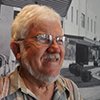Geoff Page
Geoff Page is based in Canberra. His books include 1953 (UQP 2013), Improving the News (Pitt Street Poetry 2013), New Selected Poems (Puncher & Wattmann 2013), Aficionado: A Jazz Memoir (Picaro Press 2014), Gods and Uncles (Pitt Street Poetry 2015), Hard Horizons (Pitt Street Poetry 2017) and PLEVNA: A Verse Biography (UWA Publishing 2016). He also edited The Best Australian Poems 2014 and The Best Australian Poems 2015 (Black Inc). His most recent books are in medias res (Pitt Street Poetry, 2019) and Codicil (Flying Islands Press, 2020)
Since 1982, Robyn Rowland has published three poetry collections at roughly ten-year intervals. She has also been an eminent, sometimes controversial, academic. Her poetry must have been a release from the stylistic and emotional restrictions of her academic work.
Fiery Waters, her new collection, is a leisurely and deeply felt progress across most aspects of a middle-aged woman’s life. Both se ... (read more)
Alex Skovron has always been a clever poet, sometimes playfully so, more often seriously so. Skovron, who was born in Poland in 1948 and came to Australia, via Israel, in 1958, is steeped in the European intellectual tradition, though he wears his erudition lightly. Like almost everyone else, Skovron is troubled by the twentieth century: it seems to hang over the horizon of this book. He is also c ... (read more)
Andrew Sant is a substantial yet somewhat elusive figure in contemporary Australian poetry. Born in London, he arrived in Melbourne with his parents at age twelve in 1962. Over the years, he has published at least eleven collections, co-founded the literary magazine Island, and been, for a time, a member of the Literature Board of the Australia Council. More recently, Sant has lived and worked in ... (read more)
... (read more)
John Jenkins (especially in his collaborations with Ken Bolton) is normally thought of as an ‘experimental’ poet, but in Growing up with Mr Menzies he is on more traditional ground. Born in 1949 in Melbourne, Jenkins has created the fictional character Felix Hayes, who was also born in 1949 in Melbourne. In a series of poems, he traces Felix’s life from birth through to early adolescence. Ra ... (read more)
Andrew Taylor has been an important figure in the Australian poetic landscape since his first book, The Cool Change, appeared in 1971. Identified with no particular group or aesthetic tendency, he has worked as poet and academic in Melbourne, Adelaide, and Perth, and is now retired from teaching and based in Sydney.
At the time of The Cool Change, Taylor looked to be the promising successor to Me ... (read more)
Mark O’Connor is a poet who has been in the news lately. Following in the steps of the ancient Greek poet, Pindar, he was appointed (by the Australia Council) as ‘official’ Olympic poet – though it seems inevitable that much of his work will concern only the Olympic flame on its way to the Games and the events to be seen on TV since neither SOCOG nor the Australia Council saw fit to give h ... (read more)
Probably not too many would quarrel with Evan Jones’ light-hearted description of himself as ‘one of our twenty best-known poets under forty in some views…’ Though closer now to fifty than forty, Jones in his three books so far has shown himself to be one of those academic poets of great fluency in traditional forms, capable of whipping up a cigar-and-port entertainment at a moment’s not ... (read more)
American/Australian poet, David Mason, is also a verse novelist, librettist, and essayist. His latest collection of essays, Incarnation and Metamorphosis: Can literature change us?, is clearly the work of a man who enjoys literature as he finds it rather than as he is told to see it. He is not afraid to declare in his introduction that ‘[s]ome literary works are better than others’. It is the ... (read more)

